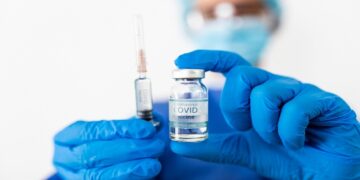Clinical trial to assess safety and efficacy of immuno-oncology combination in patients with advanced NSCLC or melanoma
Syndax Pharmaceuticals, Inc. and Merck (NYSE:MRK), known as MSD outside the United States and Canada, today announced the dosing of the first patients in the Phase 1b/2 clinical trial of Syndax’s entinostat in combination with Merck’s anti-PD-1 therapy KEYTRUDA® (pembrolizumab) in patients with non-small cell lung cancer (NSCLC) or melanoma. The clinical trial, designated ENCORE 601 by Syndax and KEYNOTE 142 by Merck, is evaluating the safety, tolerability and efficacy of entinostat, an oral, small molecule that targets immune regulatory cells, combined with KEYTRUDA, an anti-programmed cell death protein 1 (anti-PD-1) antibody.
“This is an important clinical milestone for Syndax and our collaboration with Merck that was achieved on schedule with our joint development plan,” said Michael L. Meyers, M.D., Ph.D., Syndax’s Chief Development Officer. “As entinostat has been shown in preclinical models to reduce the number and inhibit the function of host immune suppressor cells, we believe that entinostat combined with KEYTRUDA could result in an improved response rate for the combination compared to either agent alone. The initiation of this trial advances our immuno-oncology program developing entinostat as a
potential combination therapy in multiple cancer indications with an initial focus on tumors that have shown sensitivity to immunotherapy.”
“Our collaboration with Syndax exemplifies our interest in exploring innovative therapeutic combinations with KEYTRUDA,” said Eric Rubin, M.D., vice president and therapeutic area head, early-stage oncology development, Merck Research Laboratories. “We are pleased with the rapid initiation and progress being made by Syndax towards gaining a better understanding of the potential of KEYTRUDA and entinostat in these difficult-to-treat patient populations.”
The ENCORE 601/KEYNOTE 142 trial is designed as a Phase 1b/2 open label clinical trial with dose escalation for entinostat, in which the Phase 1b portion will evaluate the safety and tolerability of the combination of entinostat and KEYTRUDA in patients with NSCLC, and the Phase 2 portion will assess the safety and preliminary efficacy of the combination in separate cohorts in patients with NSCLC or melanoma. The trial will be conducted in the United States and is expected to enroll up to 178 patients.
About KEYTRUDA® (pembrolizumab)
KEYTRUDA is a humanized monoclonal antibody that blocks the interaction between PD-1 and its ligands, PD-L1 and PD-L2. By binding to the PD-1 receptor and blocking the interaction with the receptor ligands, KEYTRUDA releases the PD-1 pathway-mediated inhibition of the immune response, including the anti-tumor immune response. KEYTRUDA is indicated for the treatment of patients with unresectable or metastatic melanoma and disease progression following ipilimumab and, if BRAF V600 mutation positive, a BRAF inhibitor. This indication is approved under accelerated approval based on tumor response rate and durability of response. An improvement in survival or disease-related symptoms has not yet been established. Continued approval for this indication may be contingent upon verification and description of clinical benefit in the confirmatory trials.
Selected Important Safety Information for KEYTRUDA
Pneumonitis occurred in 12 (2.9%) of 411 patients, including Grade 2 or 3 cases in 8 (1.9%) and 1 (0.2%) patients, respectively, receiving KEYTRUDA.
Monitor patients for signs and symptoms of pneumonitis.
Evaluate suspected pneumonitis with radiographic imaging. Administer corticosteroids for Grade 2 or greater pneumonitis. Withhold KEYTRUDA for Grade 2; permanently discontinue KEYTRUDA for Grade 3 or 4 pneumonitis.
Colitis (including microscopic colitis) occurred in 4 (1%) of 411 patients, including Grade 2 or 3 cases in 1 (0.2%) and 2 (0.5%) patients, respectively, receiving KEYTRUDA. Monitor patients for signs and symptoms of colitis. Administer corticosteroids for Grade 2 or greater colitis. Withhold KEYTRUDA for Grade 2 or 3; permanently discontinue KEYTRUDA for Grade 4 colitis.
Hepatitis (including autoimmune hepatitis) occurred in 2 (0.5%) of 411 patients, including a Grade 4 case in 1 (0.2%) patient, receiving KEYTRUDA. Monitor patients for changes in liver function.
Administer corticosteroids for Grade 2 or greater hepatitis and, based on severity of liver enzyme elevations, withhold or discontinue KEYTRUDA.
Hypophysitis occurred in 2 (0.5%) of 411 patients, including a Grade 2 case in 1 and a Grade 4 case in 1 (0.2% each) patient, receiving KEYTRUDA.
Monitor patients for signs and symptoms of hypophysitis (including hypopituitarism and adrenal insufficiency). Administer corticosteroids for Grade 2 or greater hypophysitis. Withhold KEYTRUDA for Grade 2; withhold or discontinue for Grade 3; and permanently discontinue KEYTRUDA for Grade 4 hypophysitis.
Hyperthyroidism occurred in 5 (1.2%) of 411 patients, including Grade 2 or 3 cases in 2 (0.5%) and 1 (0.2%) patients, respectively, receiving KEYTRUDA. Hypothyroidism occurred in 34 (8.3%) of 411 patients, including a Grade 3 case in 1 (0.2%) patient, receiving KEYTRUDA. Thyroid disorders can occur at any time during treatment. Monitor patients for changes in thyroid function (at the start of treatment, periodically during treatment, and as indicated based on clinical evaluation) and for clinical signs and symptoms of thyroid disorders. Administer corticosteroids for Grade 3 or greater hyperthyroidism.
Withhold KEYTRUDA for Grade 3; permanently discontinue KEYTRUDA for Grade 4 hyperthyroidism. Isolated hypothyroidism may be managed with replacement therapy without treatment interruption and without corticosteroids.
Type 1 diabetes mellitus, including diabetic ketoacidosis, has occurred in patients receiving KEYTRUDA. Monitor patients for hyperglycemia and other signs and symptoms of diabetes. Administer insulin for type 1 diabetes, and withhold KEYTRUDA in cases of severe hyperglycemia until metabolic control is achieved.
Nephritis occurred in 3 (0.7%) patients, consisting of one case of Grade 2 autoimmune nephritis (0.2%) and two cases of interstitial nephritis with renal failure (0.5%), one Grade 3 and one Grade 4.
Monitor patients for changes in renal function. Administer corticosteroids for Grade 2 or greater nephritis. Withhold KEYTRUDA for Grade 2; permanently discontinue KEYTRUDA for Grade 3 or 4 nephritis.
Other clinically important immune-mediated adverse reactions can occur. The following clinically significant immune-mediated adverse reactions occurred in patients treated with KEYTRUDA: exfoliative dermatitis, uveitis, arthritis, myositis, pancreatitis, hemolytic anemia, partial seizures arising in a patient with inflammatory foci in brain parenchyma, severe dermatitis including bullous pemphigoid, myasthenic syndrome, optic neuritis, and rhabdomyolysis.
For suspected immune-mediated adverse reactions, ensure adequate evaluation to confirm etiology or exclude other causes. Based on the severity of the adverse reaction, withhold KEYTRUDA and administer corticosteroids. Upon improvement of the adverse reaction to Grade 1 or less, initiate corticosteroid taper and continue to taper over at least 1 month. Restart KEYTRUDA if the adverse reaction remains at Grade 1 or less. Permanently discontinue KEYTRUDA for any severe or Grade 3 immune-mediated adverse reaction that recurs and for any life-threatening immune-mediated adverse reaction.
Infusion-related reactions, including severe and life-threatening reactions, have occurred in patients receiving KEYTRUDA. Monitor patients for signs and symptoms of infusion-related reactions including rigors, chills, wheezing, pruritus, flushing, rash, hypotension, hypoxemia, and fever. For severe or life-threatening reactions, stop infusion and permanently discontinue KEYTRUDA.
Based on its mechanism of action, KEYTRUDA may cause fetal harm when administered to a pregnant woman. If used during pregnancy, or if the patient becomes pregnant during treatment, apprise the patient of the potential hazard to a fetus. Advise females of reproductive potential to use highly effective contraception during treatment and for 4 months after the last dose of KEYTRUDA.
KEYTRUDA was discontinued for adverse reactions in 9% of 411 patients. Adverse reactions, reported in at least two patients, that led to discontinuation of KEYTRUDA were: pneumonitis, renal failure, and pain. Serious adverse reactions occurred in 36% of patients. The most frequent serious adverse reactions, reported in 2% or more of patients, were renal failure, dyspnea, pneumonia, and cellulitis.
The most common adverse reactions (reported in at least 20% of patients) were fatigue (47%), cough (30%), nausea (30%), pruritus (30%), rash (29%), decreased appetite (26%), constipation (21%), arthralgia (20%), and diarrhea (20%).
The recommended dose of KEYTRUDA is 2 mg/kg administered as an intravenous infusion over 30 minutes every three weeks until disease progression or unacceptable toxicity. No formal pharmacokinetic drug interaction studies have been conducted with KEYTRUDA. It is not known whether KEYTRUDA is excreted in human milk. Because many drugs are excreted in human milk, instruct women to discontinue nursing during treatment with KEYTRUDA. Safety and effectiveness of KEYTRUDA have not been established in pediatric patients.

















